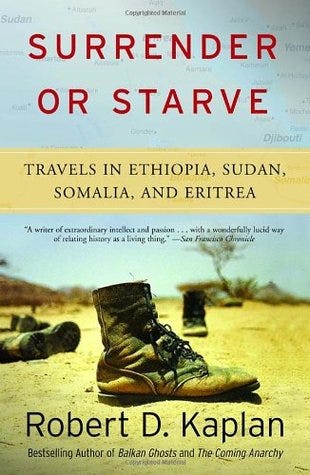Review: Surrender or Starve: Travels in Ethiopia, Sudan, Somalia, and Eritrea
In the 1980s, Robert Kaplan traveled to Ethiopia to cover a horrifying internal armed conflict that was being inaccurately reported by foreign media as a famine. Images of starving Ethiopian peasants were starting to fill the TV screens of Westerners, to whom it was incorrectly being implied that the culprit was drought. In reality the starvation was being deliberately engineered by a ruthless Ethiopian military junta known as the Dergue, which, along with Soviet advisors, was implementing an African version of the Red Terror against its own citizens. Peasants were being denied food and forcibly collectivized onto villages and farms, almost always with brutal violence. Particularly targeted were minorities such as Tigrayans and Oromos who were historically disadvantaged by the Amhara-dominated central government. For well over a decade Ethiopia was plunged into a full blown civil war that included a separatist movement to create the independent state of Eritrea.
This book is an account of Kaplan's travels in Ethiopia and bordering nations at the time. It is a piece of reporting that is also a polemic against what he viewed as the naive and complicit role that Western media and governments played in the conflict. The former were accused of missing the story, while the latter, assisted by misguided reports from the former, were using money intended to save starving peasants as a tool to prop up one of the most totalitarian regimes in the Third World. As Kaplan described it, the Dergue was using starvation as a weapon of war against a peasantry that it was forcibly collectivizing, slaughtering, raping, and expelling from their lands. The regime then turned around and used Western aid as a means of maintaining the support of its own base. Its opponents meanwhile were simply given the choice to "surrender or starve." During the Cold War, when this book was written and the conflict took place, such a conflict, with complex ethnic and local historical drivers, could be plausibly depicted by journalists like Kaplan as part of the latest showdown between the democratic free world and the forces of global Communist totalitarianism.
If the Dergue are the villains of Kaplan's telling of the conflict, the Eritrean and Tigrayan rebel groups fighting against them are unequivocally the heroes. Kaplan is particularly enamored of the Eritrean militias, whom he describes as perhaps the only rebels on earth that materially support the population they represent rather than exploiting them. The nominally leftist Eritrean People's Liberation Front fought the Dergue in grueling warfare aimed at separating themselves from the Amhara-dominated central government. But they also provided food, healthcare, and jobs to the people under their control. Kaplan spends time with Eritrean leader Isiais Afwerki with whom he is clearly enamored, not just because of his battlefield accomplishments but because Afwerki repeatedly promises to be an ally of Israel. His almost uncritically positive depictions of the EPLF and Afwerki look awkward today given the totalitarian isolation to which independent Eritrea has now fallen. Incredibly, decades after this book was written, Afwerki is still president of Eritrea.
The Ethiopian civil war killed at least half a million people by direct violence, including WWII style trench and tank warfare, as well as wholesale massacres of towns and villages. Over a million more people were killed through forced starvation policies that generated widespread famine. The real numbers may well be several times higher than recorded, as many of the worst crimes happened in areas where no reporters ever really went. Its sobering to consider the incredible magnitude of terror that was inflicted on the Ethiopian people during this period. The scale and totality of the violence, the wholesale destruction of culture and society, rivalled the crimes of the most sophisticated totalitarian regimes of the 20th century. Appropriately enough it happened with Soviet support as part of a grand plan to create an Eastern Bloc in the Horn of Africa. There is a lot that to take umbrage with in Kaplan's writing, including his partisanship, motivated reasoning, and frankly condescending attitude towards Africans and Arabs. Kaplan clearly has a bone to pick with his colleagues and spends a lot of time discussing their shortcomings. He also writes forthrightly from the position that the West is noble and everyone else, at best, are its good students. It's not a tone or perspective that you hear as much today when the West has gone into relative decline. Ironically that is part of what makes it feel a bit novel to read. The author's persona aside, the simple facts about the history of the war that he wrote about here were useful and its all done in his undeniably eloquent reporting style.
The Ethiopian Civil War and terror prosecuted by the Dergue was a horrible conflict that deserved to be remembered among the great tragedies of the last century, but was ignored simply for having taken place in Africa. Reading this history shed a lot of light for me on the contemporary war between Tigrayans and the Ethiopian government. The violence today is on a clear continuum with that period a few decades back in which the Marxist central government of modern Ethiopia attempted to forcibly subjugate and homogenize its minorities in a manner and on a scale of which Emperor Haille Selassie could only dream. The Dergue failed, but they left a legacy of harrowing violence that continues to shape Ethiopia today. It really is true that civil wars mess up societies in a way that is often far more lasting and pervasive than attacks from external enemies. One can only hope that Ethiopia finds a way to break this tragic cycle for good and realize its great potential.


Very glad you are using Substack.